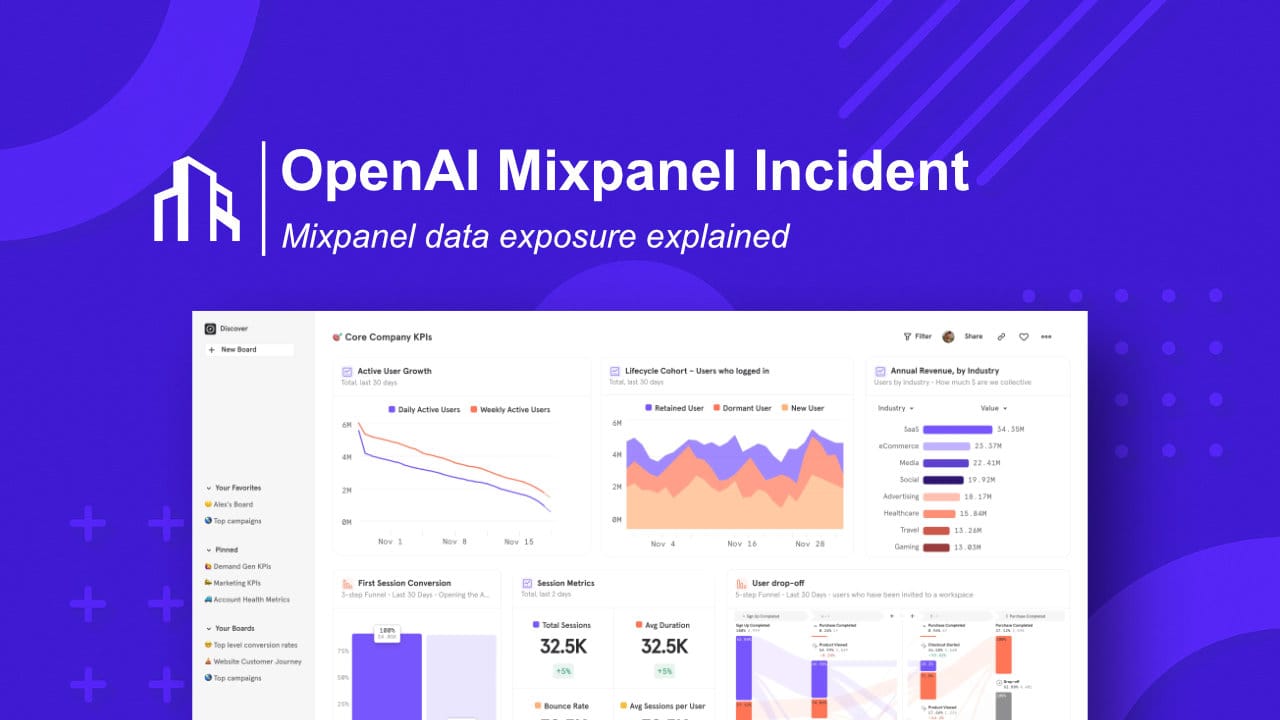OpenAI Mixpanel Security Incident Explained And What It Means For API Users
A practical breakdown of the OpenAI Mixpanel incident and what teams should do to harden security and reduce phishing risks.

The recent Mixpanel security incident triggered a wave of concern across teams who rely on OpenAI’s platform for automation, development and production workflows. Although the breach did not occur inside OpenAI’s own systems, the exposure of analytics data at a third party vendor raises important questions about the resilience of the wider AI toolstack.
This article provides a clear breakdown of what happened, what data was affected, the potential risks, and the practical steps API teams should take to strengthen their security posture.
What happened inside Mixpanel
On November ninth, Mixpanel identified an attacker who gained unauthorised access to a part of their analytics infrastructure. The attacker exported datasets containing customer identifiable information from Mixpanel’s systems. OpenAI confirmed that its own systems, API environments, and customer data were not compromised.
The exposed dataset included:
- Name associated with the API account
- Email address tied to the account
- Coarse location based on the user’s browser
- Operating system and browser details
- Referring websites
- Internal organisation or user identifiers
No API keys, passwords, chat logs, payment details or usage data were included.
Why metadata exposure still matters
Metadata often provides attackers with enough context to craft believable and targeted phishing messages. Even without sensitive data, the exposed information can be used to increase credibility in social engineering attempts.
This type of metadata enables attackers to:
- Personalise phishing emails
- Imitate vendors or platforms you use
- Reference your location or device details
- Pretend to follow up on legitimate OpenAI activity
When teams operate in complex environments with many SaaS vendors, even limited leaks become potential attack paths.
What teams should do next
Security teams should treat the Mixpanel incident as an opportunity to strengthen governance and verification processes around AI workflows.
Strengthen verification of OpenAI related communication
Adopt a verification rule for any email referencing:
- Security alerts
- Account changes
- Billing or subscription updates
- API usage or actions
Messages must be validated through the official OpenAI dashboard.
Enforce multi factor authentication
MFA closes one of the most common entry points for attackers. Every OpenAI admin and developer account should be secured immediately.
Improve vendor governance
Map and assess every vendor in your AI workflow:
- Which data do they collect
- How long it is retained
- What security certifications they maintain
- How they detect or report incidents
Review internal access surfaces
Ensure credentials and API keys are:
- Rotated regularly
- Stored centrally
- Protected with least privilege policies
- Not cached or logged in browser tools
The growing need for AI governance
As organisations expand agentic workflows and multi vendor architectures, governance becomes essential. Companies should invest in capabilities such as:
- Centralised audit logs
- Access control policies
- Vendor risk scoring
- Data residency mapping
- Anomaly detection for API activity
With the EU AI Act approaching full enforcement, companies that build governance early will be far ahead of compliance requirements.
The broader industry shift
OpenAI responded by removing Mixpanel from production and expanding security reviews across its vendor ecosystem. This signals a larger shift: vendors must meet higher standards, and organisations integrating AI must mature their internal governance frameworks.
Security incidents will continue to appear. The priority is not elimination but resilience: identifying weak links early and creating workflows that can withstand disruptions.
Final recommendations
The OpenAI Mixpanel incident should be treated as an early warning. Not because sensitive data was leaked, but because it reveals how interconnected the AI and SaaS ecosystem has become.
Your next steps:
- Strengthen verification and phishing defence
- Enforce mandatory MFA
- Enhance vendor governance policies
- Improve logging and monitoring around all AI workflows
- Prepare for compliance requirements under the EU AI Act
A robust AI security posture is a strategic advantage as organisations scale their automation and agentic systems.
